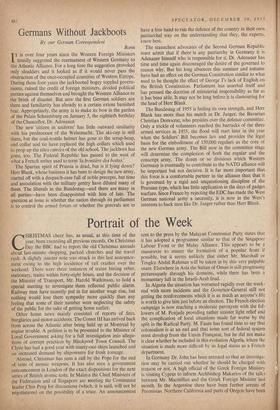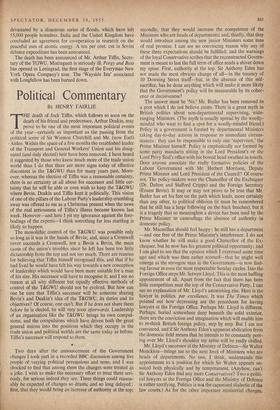True, the violence of the Poujadistes has prevented meetings in
some regions and turned them into bear-gardens in others like the Yonne. Some deputies think that it is not necessary to speak to groups, but to show oneself, to chat with the maire and the adjoints and to trinquer with the local militants. (The effects on the livers of politicians of a campaign in rural France must be terrible.) But when all is said and done, there is genuine interest and a genuine debate.
What is the debate about? It would be simple to see it in terms of intelligence and righteousness as do the . editorial writers and reporters of L'Express. That pugnacious journal, recently turned into a daily, is righteous and self-righteous to a degree that would have seemed excessive to Mr. Gladstone in his time, or to Dr. Summerskill in ours. But it is not so simple as that. All wisdom and probity are not to be found in the ranks of the Front Republicain, and a movement for the renewal of French political life such as the Front Republicain professes to be suffers a little from.the patronage of the two Edouards, Herriot and Daladier, the first and second `grand old men' of the Third Republic. The oddities of some apparentements do shock, especially the young. 'La recherche drapparentement est interdite' ought to be added to the Code Napoleon. Especially important is the alienation from the MRP of so many enthu- siastic young people. As Mr. Philip Williams has acutely Three main points have been raised by those who are concerned to defend Casement's character. Did Casement write the diary and, if so, was it a true account of his own life'? Was he a homosexual, or was he' merely one of those celibates who arouse prurient curiosity, sometimes with good reason, sometimes not, in clubland? Homosexuality is a vague term capable of much abuse. Casement was a much-hated man in the England of his day, and there were many who were incapable of giving him the benefit of the doubt that existed. And where, is the diary at the present moment—so that the truth of the accusation might be tested by properly qualified historians?
Amid ' the prevailing confusion of assertion and counter- assertion, some facts are uncontested. No author has claimed to have seen the original document on which the allegation was based; and none of those cited as having read portions of the diary—such as the American Ambassador, William .Page—is reported as having been shown the original. An American press correspondent who was in London during Casement's trial asked Hall for permission to see the original, and for leave to inquire from Casement personally if he admitted its authenticity. Both requests were refused. Why? Allen's request was not impertinent, because Hall had sought him out with a view to offering free circulation of parts of it —the incriminating parts, of course--in the American press.
Casement was allowed to go to his death without being



























 Previous page
Previous page